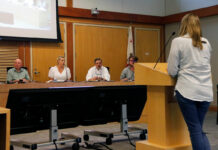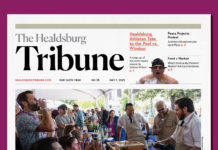Healdsburg’s Growth Management Ordinance (GMO) is a citizen initiative enacted to preserve the town’s unique quality and character and insulate it from the pressures of unregulated market driven development. It effectively put the brakes on residential development and allowed the community to contemplate its future free from outside development pressures. The GMO’s authors and supporters are to be commended for their courage, perseverance and continued resolve.
However, like any regulatory effort, the GMO has had both intended and unintended consequences. As we emerge from the nationwide recession and the development pressures that originally inspired the GMO return in force, I feel it is time that we examine the unintended consequences, not to eliminate the GMO, but to modify it to better serve the current needs of our community.
In my opinion, this should not be seen as a pro-growth/anti-growth issue. Growth and change will occur in our community with the current GMO or with a modified GMO. The issue is the character of that growth. Will it be predominantly resident serving or visitor serving? Will it help to continue our traditional role as a diverse community with citizens of many ages, incomes and occupations or will it lead us further down the path to being primarily an exclusive community for the privileged and wealthy?
The unintended consequences of the current GMO are the result of it being a one size fits all solution to a very diverse range of problems. While it excludes subsidized low income housing projects and second dwelling units (granny units), the regulation lumps together all other forms of housing in all locations under the same set of rules. This has three unintended detrimental effects on the future of our community:
1. By not differentiating between for sale and rental housing, the GMO (unintentionally) favors lower density, more expensive single family detached development because it is easier to phase and possible to finance in small increments over higher density, more affordable rental housing which cannot be phased or financed in such small increments.
2. By not differentiating between higher density infill housing within the town center and lower density housing at the town perimeter, the GMO (unintentionally) favors visitor serving commercial development over community serving residential development in those areas most likely to change in the near future.
3. By essentially taking housing off the table in any negotiations between the town and potential developers, the GMO (unintentionally) prevents the city from advocating for increased affordable residential development in exchange for the right to commercial development within any of those areas likely to see change.
As a result of these unintended consequences, the current GMO, enacted to preserve the quality and character of Healdsburg is ironically (and unintentionally) working to undermine that character by fostering a less diverse, more exclusive and more visitor centered community. By modifying the GMO to allow areas of higher density development within the town center, differentiate between rental and for sale housing and restore the ability of the town to negotiate more resident serving development solutions within those areas most likely to change, we can preserve both the original intent of the GMO and the future quality and character of the community it was meant to protect.
Jon Worden is a Healdsburg resident








